Grassland rangers
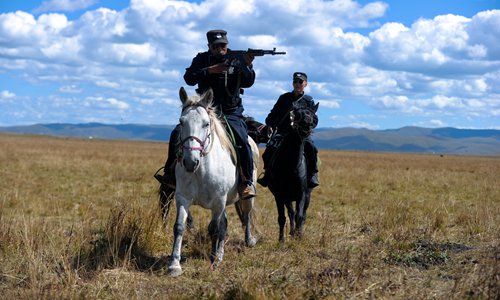
A mounted policeman aims his rifle. Photo: CFP
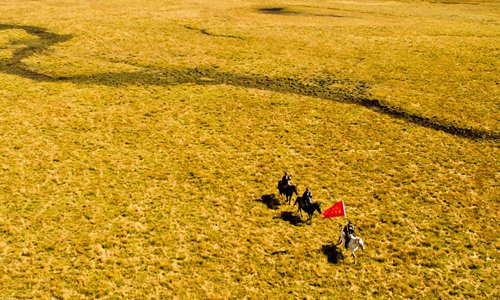
Officers often have to ride for days in the wilderness on one single patrol. Photo: CFP
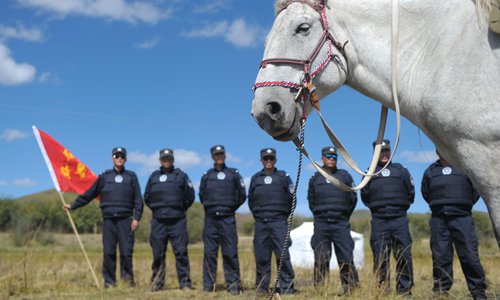
Policemen stand with a red flag. In the vast expanse of the grassland, it's easier to guide with bright colors. Photo: CFP
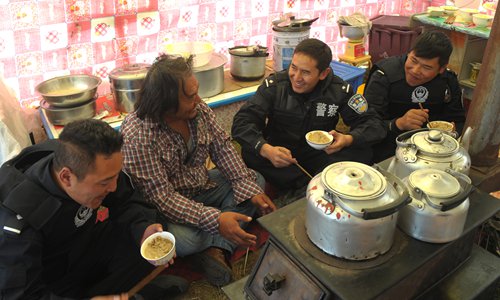
Policemen sit down together to eat. They often don't get good meals when they are out on patrol. Photo: CFP
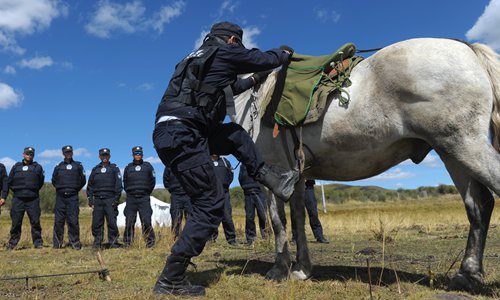
A policeman mounts his horse. Photo: CFP
Twenty-four-year-old Dorje has just become a policeman and the first thing he needs to learn is horseback riding.
Dorje is an ethnic Tibetan and mounted police officer in Aba Tibetan and Qiang Autonomous Prefecture, Sichuan Province. Because of the area's vast grasslands and poor infrastructure, it's impossible for police to patrol in cars or on foot and they need to ride horses to get around quickly.
A few days into the training, Dorje is still learning how to mount his horse. He imagined it would be quite cool, like in cowboy movies. But in reality, he has had to hold the reigns for so long that his hands have become blistered.
In the future, he'll have to learn to find his way through swampy areas, to track thieves and to avoid wolves in the remote region.
These policemen's biggest problem isn't wild animals, but livestock thieves.
"All they need is a horse and a gun. They eat tsamba (traditional Tibetan roasted barley flour) when they are hungry and drink from the rivers when thirsty. They can live in the wilderness for months," said Tashi, a mounted police officer with the Songpan county in Aba.
Most of the thieves were once herdsmen and know the environment well. They became thieves mostly because they are indebted. Before they steal livestock, they observe from the distance for days, deciding which farm is easier to raid. Then in the dead of night, they suddenly strike out, cut open fences and spirit away hundreds of horses, sheep or cattle.
Officer Tashi remembers once his team hid in a valley for a week, waiting for a group of horse thieves to return. But it snowed heavily one night and sealed off their way out. They then ran out of food and water. Fortunately, he had often gone scavenging with his father as a child and was able to find edible mushrooms.
Your Comment
Name E-mailRelated News
-
;
-
-
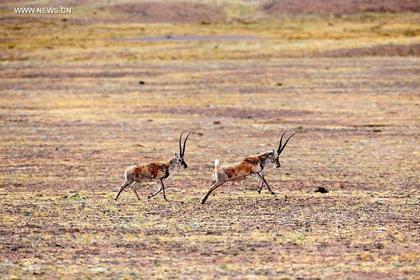
-
Two caught for poaching Tibetan antelopes
Two fugitives were arrested 11 years after they, along with four accomplices, slaughtered more than 500 endangered Tibetan antelopes in a nature reserve in Qinghai.
-
-
-
No poaching incidents occur for 9 years in Hoh Xil Nature Reserve
As one of the best preserved areas with original ecology of the world and wildlife diversity, poaching incidents have not happened for nine consecutive years.
-
-
-
Chinese police officer detained for poaching endangered animals
A police officer from northwest China's Qinghai Province was detained Sunday for being suspected of poaching endangered animals, local authority said.
-
Based in Lhasa, Tibet Vista is a Tibet travel agency that specialized in Tibet permit, and Tibet tours for both private and group travelers at a local price!
•4 Days Lhasa City Group Tour from USD 460 •8 Days Everest Base Camp Group Tour from USD 850 •15 Days Mt.Kailash Group Tour from USD 1780 •2016 Tibet Train Tours from Beijing, Shanghai, Chengdu, Xining,etc










